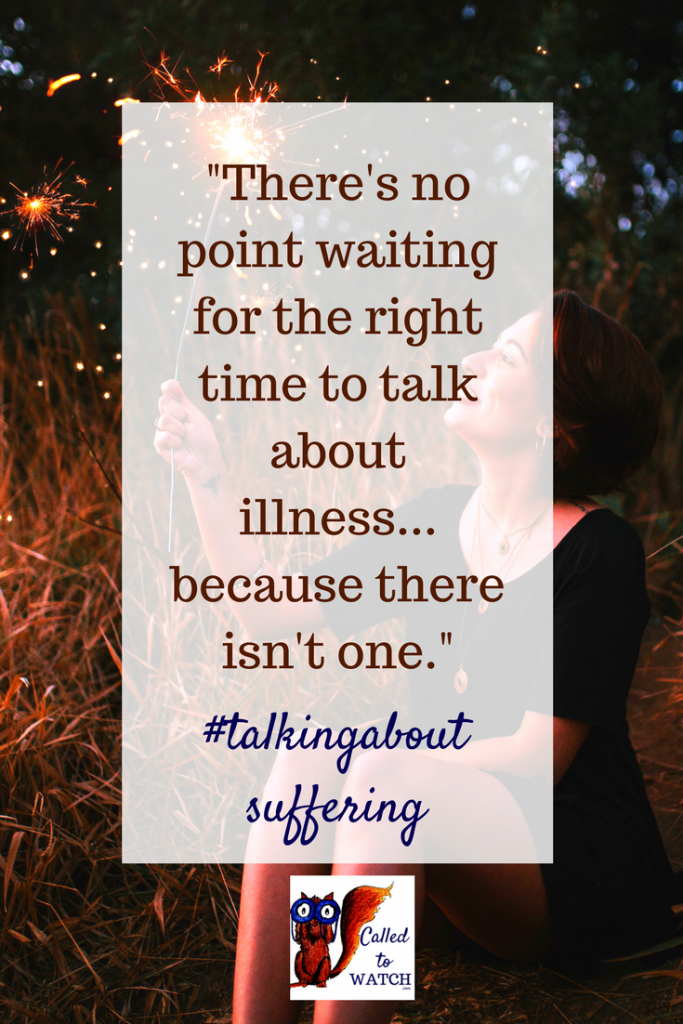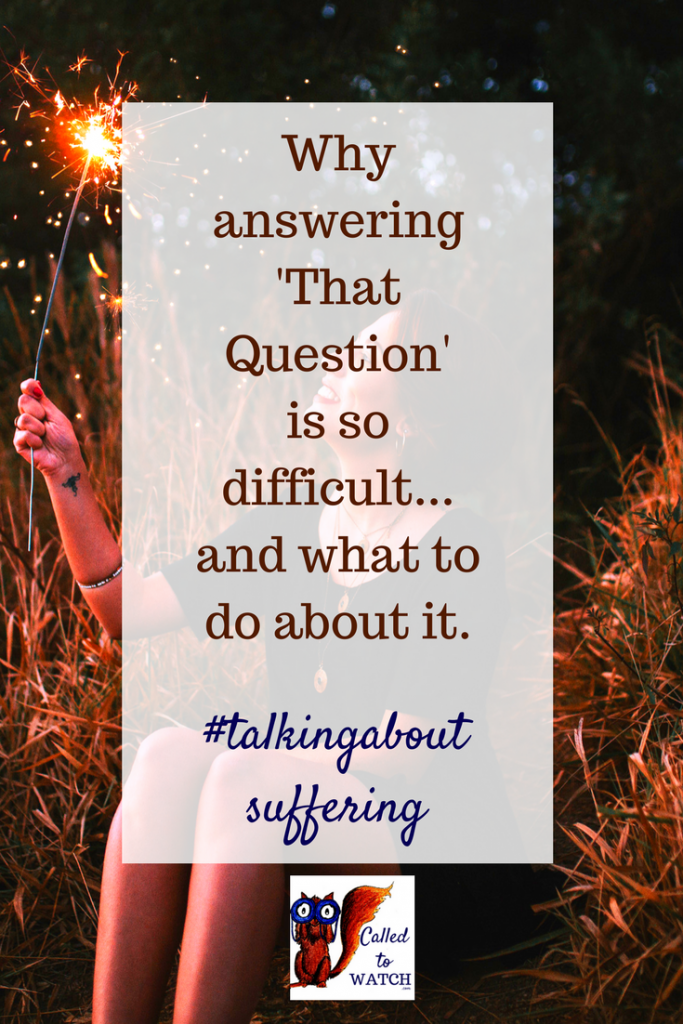Although I’ve written before about thinking before talking, and even (on occasion!) not speaking at all, the truth is…
I rather like talking.
Yet there are other topics which are less guaranteed to set off an avalanche of words. I suspect it’s the same for you.
I also suspect that one of these might be: ‘why does God allow suffering?’
It’s an important question – so why do we find it so difficult to talk about?
Talking about suffering: Why answering ‘That Question’ is so difficult
If you remember, my friend who struggles with mental illness asked me that question.
Why does God allow this suffering?
Looking a bit deeper, I think we could substitute this with:
Doesn’t God care about my pain?
Where is God right now?
Why isn’t He fixing my sickness?
Is God good?
All huge, deep, complex, emotional questions. Now, my friends, we understand that sensitivity is important and perhaps our friends aren’t always ready to listen to our answers.
But suppose they are. Suppose the timing is right, and we know the words to say.
Why do we still find it such a difficult, awkward, uncomfortable question to answer?
Objection 1: It’s a sacred question (too big for me to answer!)
If you find answering a question like this terrifying – well, you should!
A question like this invites us into the depths of another. Into their inner life, into their thoughts and experiences. They are opening themselves up to us. They are showing vulnerability.
They are asking us to stick a band-aid over their heart – and this is no small matter. If we tread wrongly there are huge consequences.
What if we unknowingly trample over their soul?
What if we accidentally dismiss their pain?
What is a nuance in our voice or a wrongly chosen word destroyed their last sliver of hope?
My friends, these are all valid concerns. After all, what right do we have to blunder into their lives and offer an answer to their hurt?
“It is no small matter to stick a band-aid over someone else’s heart.”
Answer: We are not sacred but God is
Despite all this, we can take courage. Know this:
Firstly, because they have asked us a question, our answer is not something which began in us but in them. They invited, initiated, catalysed our reaction. Don’t forget this.
Second, if you truly have the right answer, it is not mere words you are offering, but a Person. God is more than capable of using our words. He is able to protect our friend from our mistakes, and He is able to give us beautiful polished words.
He also chooses to use broken words and awkward people. He merely asks that we love, and leave Him to do the rest.
Watchers, it is right be cautious, but we must also be confident.
Objections 2: But it’s not the right time!
Often when we want to have a deep conversation, we simply ‘change the gears’ and settle down on the couch. But as we know, that’s not so easy when you’re sick, for a multitude of reasons:
Our Loved Ones might struggle to have enough metal-space to focus on the issue at hand.
Perhaps they’re in pain, or exhausted, or simply anxious and stressed.
Maybe we’ve been rebuffed with a “I can’t concentrate right now”, or “I don’t have time for this.”
It’s easy to use these truths as excuses.
Yet if we plan on waiting for an ‘ideal time,’ we will never answer their question.
There’s no use waiting for the right time to talk about illness because there isn’t one.
So what do we do?
Answer: We find ‘a’ time
Just because there’s no ideal time doesn’t mean we answer ‘any’ time.
You know your Loved One, and you know yourself. There is a time to ask questions and a time to answer them, but it might not be the same time. That’s okay.
Why don’t we ask our questioner when they would like an answer?
To my friend, I could:
Acknowledge that answering her question is going to require her to sacrifice time and emotional energy.
Ask if now is a good time, and if not, when would be?
Different situations are different. Perhaps we need to be prepared to answer in a few words and then ‘finish off’ the next day. Or to throw our twenty minute response out the window, and substitute it with a two-sentence reply.
Maybe we must be willing to pick up and put down the conversation over a period of hours or weeks or even years.
Are you willing to do that?
After all, the best answers are going to be a journey. A journey to understanding, but also towards a Person.
// What holds you back from answering a ‘deep’ question? Was there ever a time you held back out of fear?
This is the third in a series of posts titled Talking about suffering.
PS: Enjoyed the post above? Get the next one delivered straight to you! Sign up for email notifications
I’m also on Facebook, Pinterest & Twitter! Meet me there for more interesting reads, resources and community.



